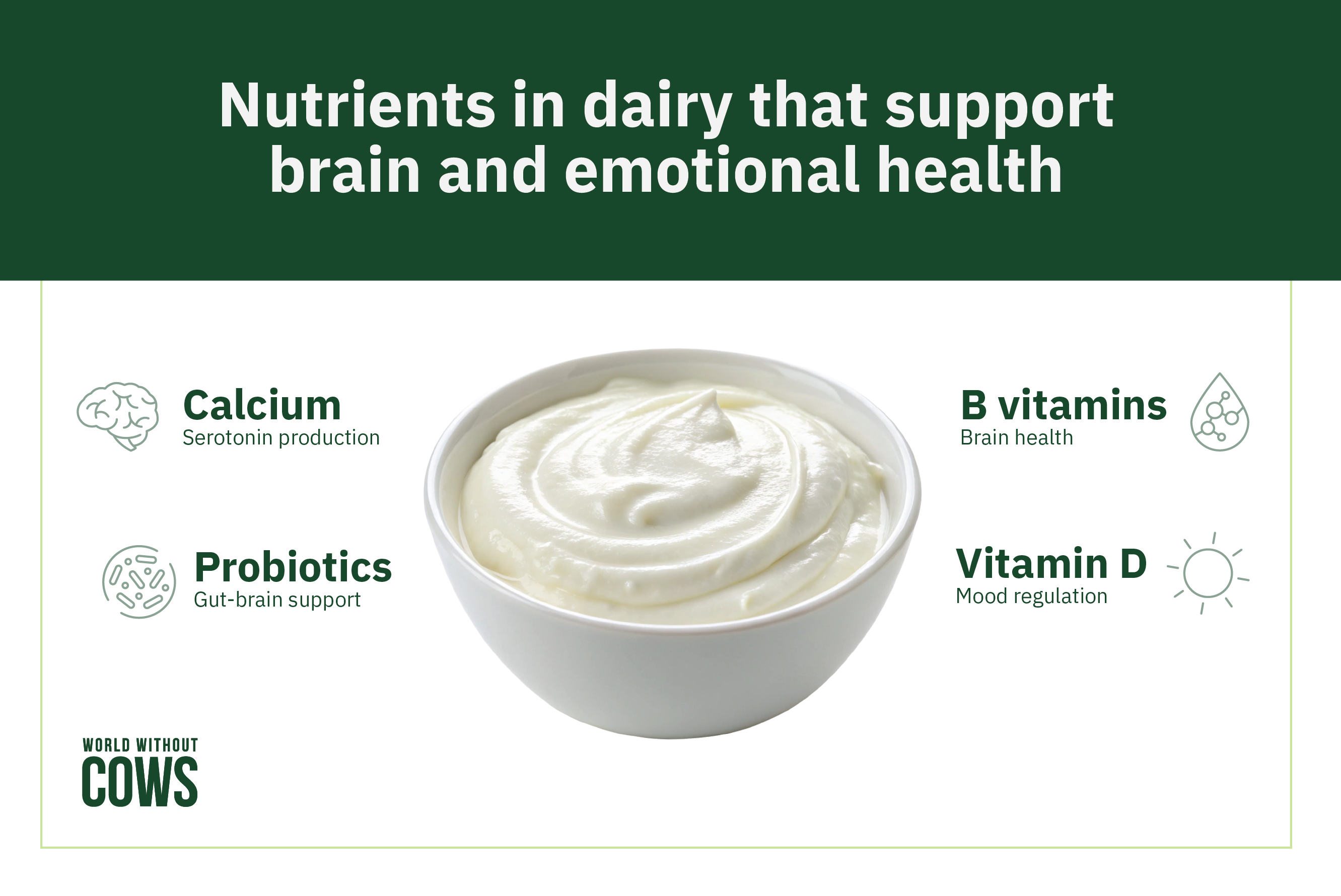
Cattle, greenhouse gases and the case for better methane metrics
Why the global warming potential of methane emissions from cattle production needs a closer look
A recent study published in Frontiers in Nutrition showed that people who regularly drank semi-skimmed milk from cows had a 12% lower risk of depression and a 10% lower risk of anxiety compared to those who chose plant-based alternatives. Even more surprising: Individuals who primarily consumed plant-based milks had a 14% higher risk of depression compared to those who drank semi-skimmed cow’s milk.
The study accounted for factors including age, socioeconomic status, lifestyle habits, diet quality and other health indicators to better isolate the relationship between milk consumption and mental health outcomes.
With data collected from more than 350,000 participants over the course of a 13-year study, these findings are more than anecdotal; they suggest that something as simple as drinking milk may be more connected to our psychological health than we realize.
As we recognize Mental Health Awareness Month this May, it’s worth taking a closer look at this fascinating connection. Let’s explore how dairy foods can influence how we think and feel — and what we might miss in a world without them.

Naturally rich in key nutrients like calcium, protein, vitamin B12 and potassium, dairy is one of the most complete nutritional food groups. Globally, it provides 5% of all energy in the human diet — and without it, we would lose a key source of the essential minerals and vitamins we need to thrive.
This matters not only in relation to our physical health but also to our emotional well-being as people. And while consuming milk and other dairy-based foods is not necessarily required to maintain strong mental health, the science tells us that they can have a major impact on how we think, feel and function.
It might not be obvious at first, but there is a biological reason for dairy’s ability to play a role in supporting mental health.
Here’s how it works:
A single cup of milk contains about 100 mg of tryptophan — an amino acid our bodies use to produce serotonin. Calcium, which is also found in dairy, helps activate the enzyme that converts tryptophan into serotonin, making dairy a natural and nutrient-rich way to support this process

While vitamin D is likely best known for its role in supporting bone health, it also can affect how we feel mentally. Low levels of vitamin D, for instance, have been consistently linked with a greater risk of depression.
That’s because vitamin D helps activate enzymes that support the production of dopamine and serotonin — neurotransmitters that help regulate mood, motivation and emotional balance.
While sunlight is a natural source of vitamin D, it’s not always easy to get enough — especially during the winter or in places where sun exposure is limited. That’s where food comes in.
A single 8-ounce (or 1-cup) serving of fortified milk in the U.S. typically provides about 100 international units (IU) of vitamin D, or 13% of the daily recommended intake for adults.
Dairy foods like milk, yogurt and cheese are naturally rich in several B vitamins — especially B2 (riboflavin) and B12 (cobalamin). These nutrients play a key role in our brain functions and emotional well-being.
One cup of milk provides around 0.45 milligrams of riboflavin (35% of the recommended daily value for adults) and 1.3 micrograms of B12 (50% of the daily value). Both of these nutrients are essential for energy production and neurotransmitter function, which support mood and cognitive health.
Research continues to prove that disruptions to the gut microbiome have been associated with anxiety, depression and changes in cognitive health. Regularly eating fermented dairy foods — like yogurt and certain cheeses, which contain probiotics — is one of the simplest ways to support gut health.
In fact, a meta-analysis of eight studies found that people who regularly consumed fermented yogurt and cheese had a lower risk of depression. Researchers believe that the probiotics found in these foods may influence brain function by shaping gut bacteria, reducing inflammation and supporting the production of neurochemicals involved in mood regulation.
Dairy isn’t the only way to get the nutrients that support human beings’ overall mental health. For billions of people, however, it remains one of the most efficient and accessible sources of those nutrients — especially in places where fortified foods or supplements aren’t widely available or easily accessible.
As we rethink the future of food, mental health needs to remain an important part of that conversation. And so does dairy. Because when we imagine a world without cows, the impact isn’t just physical or environmental; it’s emotional, cultural, nutritional — and global.
The nutrients found in dairy — including calcium, B vitamins, vitamin D, protein and probiotics — are more than just building blocks for our bodies. They’re part of the foundation for how well we think, feel and function every day.
Here’s a question to consider during Mental Health Awareness Month this May: What role does dairy play in how you feel — and what might you lose without it? Join the conversation on social media @WorldWithoutCows.

Why the global warming potential of methane emissions from cattle production needs a closer look

At COP30, the world’s eyes are on Brazil, and the cattle ranchers leading a global transformation.

Restoring 40 million hectares of pasture could feed billions and ease pressure on the Amazon. Is the world paying attention?

New mini-doc explores deforestation, food security and the Brazilian cattle sector’s path to a more sustainable future

Mention Brazilian beef, and you’re likely to spark discussion about familiar themes: deforestation, emissions and blame. What do we find when we dig deeper? Here are the answers to five top questions about Brazil’s role in protecting the Amazon and feeding the world.

From science to the big screen: Discover how a single question grew into a global journey.
As climate change intensifies and the world’s population continues to grow, the pressure on our global food production system mounts. You can play an active role in shaping a more sustainable planet for future generations. Fill out the form below to learn more about how you can partner with us.
Receive notifications about the release date, new online content and how you can get involved